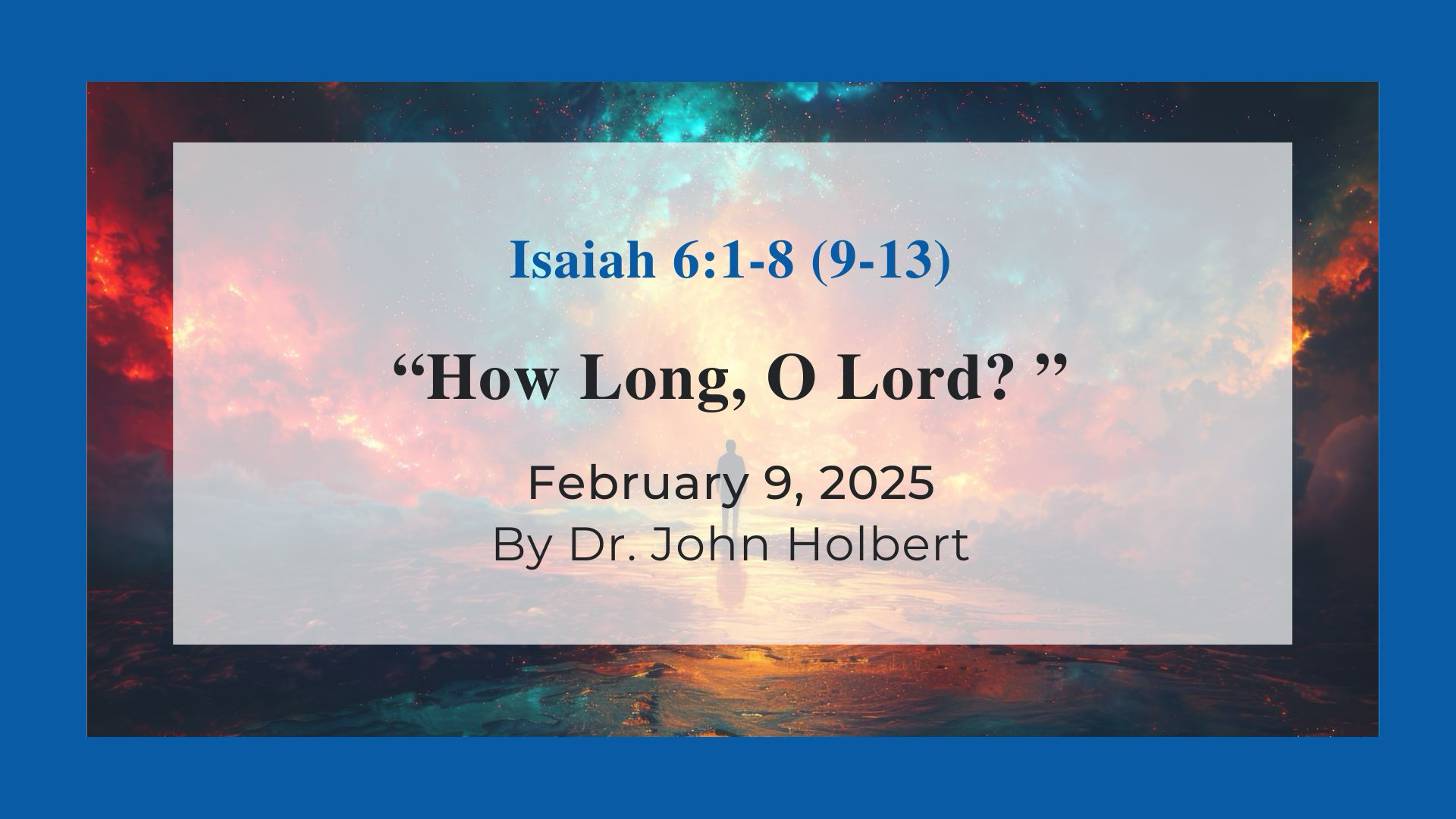How Long, O Lord? Reflections on Isaiah 6:1-8 (9-13), Epiphany 5, Year C
by John C. Holbert on Sunday, December 29, 2024

This is perhaps the most famous call story in the Bible. It has generated numerous reflections, countless hymns and anthems, and has been a significant source of urgings toward ministry down the centuries: “Here I am, send me,” is a sort of throughline for ministerial candidates from nearly every nation and from every time. “Here I am, Lord,” may be one of the most sung of modern hymns, Dan Schutte’s 1981 composition of word and music joining the ranks of classic hymnic expressions. I know that wherever I went to preach in my many years of pulpit itineracy, the hymn rarely failed to appear on the Sunday worship bulletin.
Little doubt that Isaiah’s stark depiction of his call from YHWH is among the more memorable biblical passages due to its great drama, its scenic splendor, and its very human initial rejection and ultimate acceptance of YHWH’s summons. Still, despite Schutte’s hymn, and despite the memory of Isaiah’s “ready” acceptance of the call, that acceptance was perhaps not so easy and surely not so ready. The lectionary collectors have placed vss 9-13 in parentheses, suggesting that they are not somehow a significant part of the tale. I must disagree. Those verses make plain two important factors of YHWH’s call: Isaiah’s very human reluctance and YHWH’s very divine and deeply demanding persistence. Let’s set the scene for those “added” verses, and see if they are not crucial for a fuller, more accurate reckoning of the prophet’s encounter with his God.
It is the year of Uzziah’s death (perhaps 742BCE, after a long 40-year rule), and Isaiah is in the temple to worship. But suddenly a typical service becomes very atypical indeed. “I saw ‘adonai, sitting on a raised and lofty throne, the fringe of the divine robe filling the temple; seraphs served above it, each having six wings, two covering their face, two covering their “feet,” and with two to fly” (Is.6:1-2). Isaiah does not say that he saw YHWH, but ‘adonai, a word that can be a synonym for God, but whose meaning includes concepts like “master, chief, or lord.” It is exceedingly rare in the Bible to say that “I saw God,” since the tradition states more than once to see God is to court death. In addition, Isaiah watches seraphim, serving God on the throne, whisking about with six wings. These creatures are far from the chubby-cheeked angels of Renaissance paintings; the word is built from the word for “fire,” hence they are fearsome beings, well-known from many ancient Middle-Eastern cultures. I put the word feet in italics, because “feet” is a common biblical euphemism for genitals, and it may be here that the seraphim are hiding their private parts with two of their wings, since ancient peoples were most reluctant for anyone, save very intimate relations, to view their genitals—Gen.3’s shamed couple is perhaps the most famous example.
The seraphim are flying and shouting the famous lines “Holy, holy, holy is YHWH of the armies; the entire earth is filled with God’s glory!” (Is.6:3), and as a result the entire temple shakes on its foundations, on the very bases of its thresholds, and smoke fills the whole room. And Isaiah is rightly undone: “Woe is me; I am lost! I am a man of filthy lips and I live with people of filthy lips, because my eyes have seen the king, YHWH of the armies!” (Is.6:5). But after one of the burning seraphim flies down to him, touching his lips with a flaming coal from the fiery altar, he senses his guilt leave him and his sin blotted away. So, when he now hears the call from YHWH—“Whom shall I send; who will go for us?”—the prophet now answers, famously, “Here I am! Send me!” (Is.6:8). And if we do not read on, we imagine a prophet ready for the prophetic task, equipped and sent by YHWH.
But that is clearly not the end of the divine call, nor is it all that YHWH has to say to him. So, you are ready, huh? Just listen to what I am calling you to do.
“Go, and speak to this people:
Listen carefully, but you will never comprehend;
Look intently, but do not understand.
Make the heart of this people dull;
Make their ears heavy,
their eyes closed,
lest they look with their eyes,
and hear with their ears,
and understand with their hearts, then turn and are healed” (Is.6:9-10).
Goodness gracious! Isaiah is being called not to be an agent of understanding or a healer of a sinful people. His task, says YHWH, is rather to be exactly the opposite, one who muddles the people, confuses them, makes it impossible for them to find healing.
Rightly, Isaiah now cries out, “How long, YHWH” must I do all this? And the answer is catastrophically bleak. “Until cities lie waste without inhabitants, houses without people, and the land utterly desolate” (Is.6:11). Isaiah offers no reply to that horrifying demand; where is his triumphant “send me” now?
The work of a prophet is often painful, unrelenting, vastly difficult, and personally unrewarding. Little wonder that Jesus says that a prophet has no honor in her own country, or, one might add, in any country at all. We usually honor our prophets only after they have died, doing the dangerous work they have felt called to do. Isaiah’s call will not allow us to romanticize the work of a true prophet. Be careful what you wish for, you would-be prophet, and heed Isaiah’s warning.
